My path to becoming one of the delegates representing IE University at the Harvard Model United Nations (MUN) began before I even set foot on campus last August. Even before beginning my studies, I was determined to join the Debate Club, driven by a zeal to improve my public-speaking skills and argumentation abilities. At the time, I did not know about the diverse variety of events organized by the Debate Club thanks to the tireless efforts of people like Maria Victoria Felipe, the current vice-president, Isabella Miller, the president, and Kevin Febres, the faculty adviser, alongside many others. They invest countless hours to develop an environment that fosters engaging learning, skills enhancement, and encourages everyone to step outside their comfort zone. The Debate Club has truly become a community where you get to form friendships that last a lifetime, and where every member feels like family.
However, to become a delegate is no easy task. It requires many hours of training, overcoming challenges, and replacing brunch cafés on weekends with hangouts at Maria de Molina campus as you edit your opening speech for the 15th time. Like all prospective members, I signed up for the debate training course, a requirement for joining one of the Debate Club delegations such as LIMUN (London Model United Nations), HNMUN (Harvard National Model United Nations), or UC3MUN (Universidad Carlos III Model United Nations). With each passing week, less and less people showed up to the debate training class, most likely because not many were prepared for the demanding level of commitment and dedication expected by Kevin and his team. Yet, those of us who persevered through spontaneous and sometimes very inventive homework assignments such as preparing a presentation to promote Auckland as the 2028 Olympic capital with less than two days’ notice got to showcase our skills in a MiniMUN. There, we simulated real-life MUN scenarios to prove ourselves as capable delegates.
By the end of the MiniMUN session, I found myself eagerly waiting for the final decision. When it was announced that I had won best delegate, I was overcome with excitement. It was a clear sign that all of my hard work paid off, and that I indeed could be a great debater. Little did I know, this was just the beginning of a long and intense journey that would involve late-night study sessions and preparation over the winter holidays – all in pursuit of possibly achieving the same success at the Harvard National MUN conference.
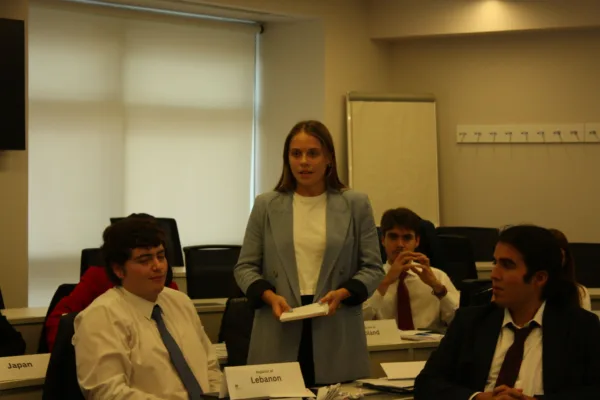
Before we received our country and committee allocations, we had to attend several training sessions covering different topics ranging from body language to persuasion. However, beyond the academic content, the primary focus was on bringing us closer together as a team and fostering a supportive environment for everyone’s personal growth. Take Christmas, for example, when we organized a Secret Santa exchange. Each member of the delegation carefully selected a book for their assigned person, accompanied by a note explaining why they believed the chosen book was meaningful to share. It was a seemingly small gesture, but it carried significant weight – it manifested the genuine desire to connect with and support one another. In the end, it is this detail that matters – the detail of being recognized in a heartwarming message. Through these details, we build meaningful connections that extend far beyond the walls of our university.
My younger self, faced language barriers and felt ashamed every time she expressed herself publicly, to the point where her anxiety was overwhelming. She choked on air during simple school presentations and would be immensely proud to see how far I have come. There is always room for improvement, but today, I truly feel like a capable and confident public speaker who makes sure their words are heard and remembered. One of the reasons this transformation was even possible was thanks to the incredible people and management in the Debate Club. My feelings are shared with Maria de la Paz Gonzalez Ross, a fellow first-year delegate at HNMUN, “Even though I came into the Debate Club without previous experience of MUN, learning about the MUN world has been truly rewarding. We have become very close with the whole delegation and I know that I can count on them for anything.”
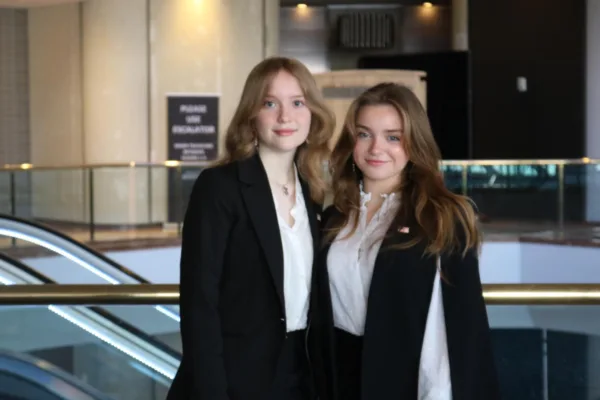
Thanks to the support and guidance of the older students like Margarita Peces Collar, Maria-Catalina Vaduva, and Leonardo Sobrecueva, as well as Kevin’s expertise, I, alongside Paula Jaramillo and Martina Al Rifai Hajjo were able to overcome some of our deepest fears. It’s clear to me now that achieving personal growth in the Debate Club is not just about mastering debate techniques—it’s about believing in oneself, stepping out of one’s comfort zone, and ultimately embracing one’s voice. Thanks to their encouragement and mentorship, I was able to reach heights I never thought possible, and for that, I will always be grateful.
Our delegation from IE University, consisting a total of 18 delegates, entered the Harvard National Model United Nations (HNMUN) conference determined to do our best and to confront any challenges that would come our way. However, we quickly realized that other delegations were equally motivated and exceptionally skilled, sometimes even impressing us with their argumentation capabilities. Universities such as UPenn, Universidad de los Andes (Colombia), Yale University, Universidad Católica Andrés Bello (Venezuela), the United Netherlands, the Peruvian Universities, and Leiden University all came well-equipped to face the competition.
HNMUN was nothing like what we expected. Despite the so-called “horror stories” shared by fellow delegates and the thorough character analyses of different types of delegates curated by our head delegates, Cassidy Lapp and Antoine Brimbal, Harvard still managed to surprise us. I speak for every member of our delegation, be they freshman or senior, and studying international relations or computer science, when I say that HNMUN lives up to its name for being the world’s most competitive MUN in the world.
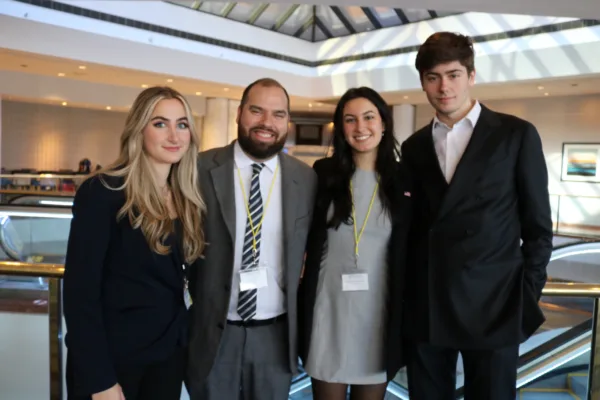
Following rigorous debate, the IE delegation proudly brought home a total of three awards, thanks to the outstanding work of double delegates Leonardo Sobrecueva and Maria Victoria Felipe in UNIFEM, Maria-Catalina Vaduva in CSTD, and Lucas Iturmendi in SPECPOL. While receiving awards is a natural part of the competition, it is important to remember that HNMUN and the Model United Nations are about something else entirely at their core – MUN is about collective achievements rather than individual victory.
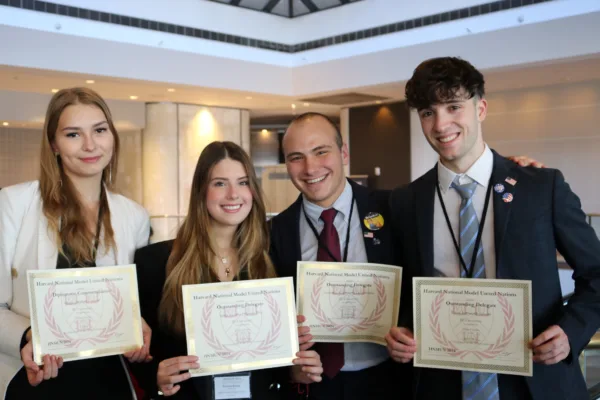
Model United Nations originally stems from a desire to understand the United Nations post-World War II and promote diplomacy and dialogue over global issues. Over the course of a few days, participants represent member states in various UN bodies, ranging from the Security Council to the General Assembly committees. In essence, Model United Nations serves as platforms for students to improve their negotiation skills and find innovative solutions to pressing global challenges. As delegates, we are not there to simply compete, but are instead responsible for contributing positively to the world around us through dialogue and cooperation.
HNMUN exceeded our expectations in this regard. Representing the United States in committees such as NATO, CSW, DISEC, UNIFEM, ECOFIN, UNHRC, CSTD, SOCHUM, the Legal Committee, SPECPOL, WHO, and GA-ADHOC, each member of our delegation played an exceptional role in their respective committees. What everyone could not ignore was the way equitable approaches used by the chair to ensure a productive flow of debate. Every chair was determined to give a chance to speak to every single delegate to assure everyone’s voice is heard. MUN is not about seizing the attention of the whole committee, or gaining dominant influence, instead it is about learning to lead fairly and inspire cooperation. This is the only way towards the creation of innovative solutions.
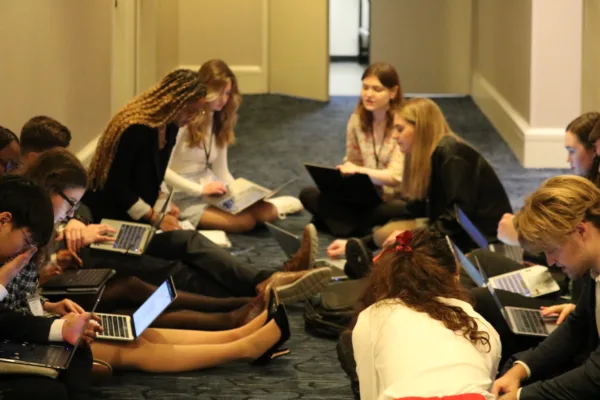
Our faculty adviser, Montserrat Cuetos de Prado, has a long history of participation in the Debate Club, having held almost every position imaginable with regard to the delegations. From being committee management to chair, to co-chair, to head of delegations, to head delegate, and now to faculty adviser, Montserrat is a delegate with numerous years of MUN experience, who decided to pass on her experience and knowledge to the next generation of IE delegates. Her passion for the strategic thinking required to excel in MUN is more than evident, and under her guidance and indispensable, continuous support during HNMUN, my perspective on leadership has changed dramatically.
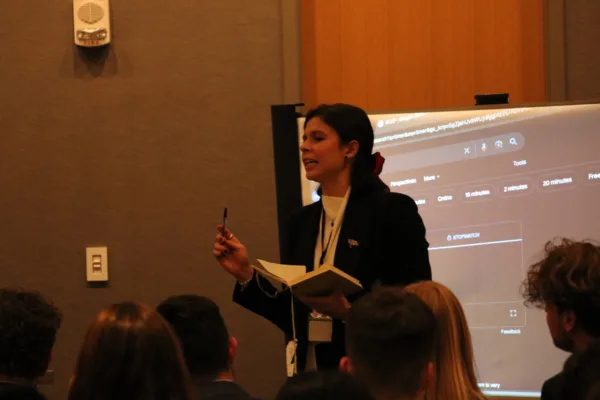
The HNMUN experience served as a shining example of what true leadership embodies: a collective effort ensuring the success of every individual through compromise and collaboration. No other conference accomplishes better examples of leadership than HNMUN. Nowhere else do students have the same opportunity to exploit their academic potential and broaden their horizons of cultural and social diversity through active negotiation and networking.
As Montserrat explains, “The unique challenge of HNMUN is that excellence is demanded on every front. It’s not enough to be charismatic, intelligent, strategic, well-spoken, experienced, or prepared – you must be all these qualities and more.” This is exactly why we, the Debate Club, compete at Harvard. It is not about the awards., Instead, it is about the invaluable skills that HNMUN gives you to succeed in your professional and personal life long term. Years down the line, former delegation members share how they used negotiation tactics learned at the conference to secure internships, relied on their networking skills to connect with influential mentors, and even how after doing Q&A at HNMUN, they feel like there is no endeavor they could not do. It is precisely this incredibly difficult environment that drives us to train rigorously and persevere through a competitive selection process. For in Harvard, we forge the skills and resilience that will serve us in every aspect of life, long after the conference has ended.
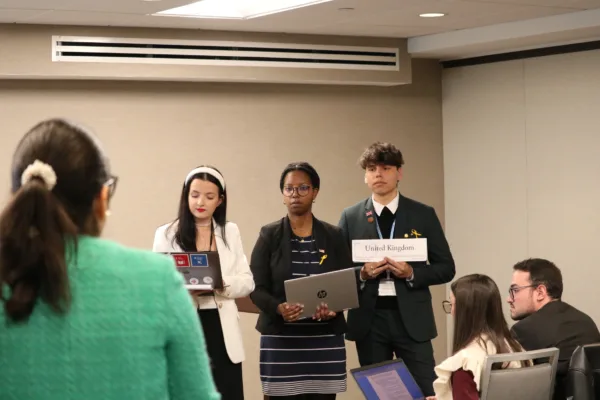
The HNMUN experience is one to remember, and I am immensely grateful for the opportunity to participate. Thank you to every member of the IE delegation who made this experience so much more meaningful. The friendships formed during MUN preparation and the conference itself often become lifelong deep connections.
HNMUN 24 tested our resilience once again and our work there serves as a testament to our personal growth. I am incredibly grateful to our mentors, Kevin and Montserrat, for their support throughout this journey. Beyond the conference call, I have discovered a community at IE where I truly belong, inspiring me to continue pushing boundaries and striving for excellence. This sense of belonging is a prize far more valuable than any award or recognition.
Lastly, thank you to IE Campus LIfe, IE Business School, IE Foundation, IE School of Politics, Economics and Global Affairs for making this possible. Without your support, attending HNMUN would have remained unattainable. Thank you for believing in us and investing in our potential. On the behalf of everyone in the Debate Club, we hope to see you competing with us next year!

Featured images by Montserrat Cuetos







